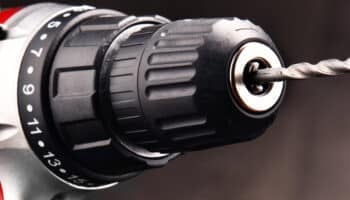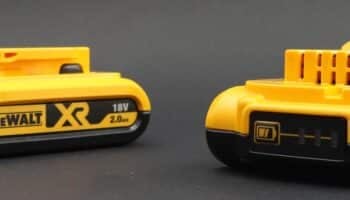We've independently reviewed this article to make sure it's as accurate as we can make it.
To find out more about our article creation and review process, check out our editorial guidelines.
Are you finding it tricky to choose between a corded vs a cordless drill?
You’re not alone! In fact, you wouldn’t believe how many people I’ve seen struggle with the same issue.
Making the right choice can feel a bit overwhelming. This is why, we’ve created a detailed guide that will help you understand the differences between these drills.
Corded drills are best for more efficient and powerful jobs, contractors, and long projects. On the other hand, cordless drills are great for tight spaces, areas with no power outlets, and small projects, making them a good choice for weekend DIY-ers.
Read on to learn more about their differences and make an informed decision!
Comparing Corded vs Cordless Drills
While we’ve looked at these drills from a birdseye view above, sometimes the best way to compare is to walk through each aspect of both options.
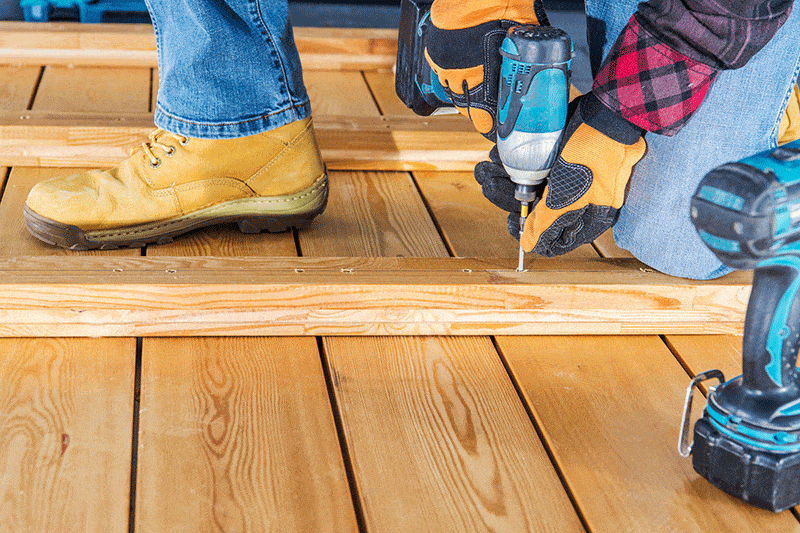
In this section, we’ll compare the 7 main differences between these drills:
#1 Precision and Power
When might you need precision and extra power whilst drilling? Perhaps when you work with thick concrete, brick, and masonry. Or even when drilling into tiles and ceramics. You may also need to unleash some super strength when you work on heavy-duty construction projects.
So which drill would serve you best on these occasions? Corded drills are better for high-precision jobs.
With a corded drill, you could get the job done:
- Faster. A corded drill has more RPM (revolutions per minute). The faster speed can help you to get jobs done quicker.
- Easier. A corded drill has a constant flow of electricity thanks to the cord which powers it. This means there are no limitations or interruptions in its voltage. With no interruptions, the drill bit rotates endlessly. The continuous rotation makes the job easier to complete.
| Corded Drills | Cordless Drills |
| Higher revolutions per minute for faster completion of jobs | Slightly lower revolution per minutes |
| It is easier to do precise work | It is more difficult to do precise work |
It’s worth mentioning that both drills are powerful, but corded drills typically have larger chuck sizes (1/2″) for more heavy-duty drilling. Using a larger bit with a cordless drill can quickly drain the battery and leave you stranded without power.
#2 Contractors and Carpenters
What kind of tools are contractors and carpenters using? They usually carry both corded and cordless drills with them. This helps them to have the right tools on hand for any kind of job.
But what if a contractor or a carpenter had to choose between a corded or a cordless drill? When choosing between the two, most would choose a corded drill. Why? For the following reasons:
- A corded drill gives them extra power and precision. This helps professionals to get the job done faster. It also helps them to continue drilling, even through tough, resilient materials.
- A corded drill gives you power all day. It’s true, it may limit your range. But, you don’t have to worry about the battery depleting on you with a corded drill.
- A corded drill has a longer lifespan. They can last for decades, but the batteries used in cordless drills will not.
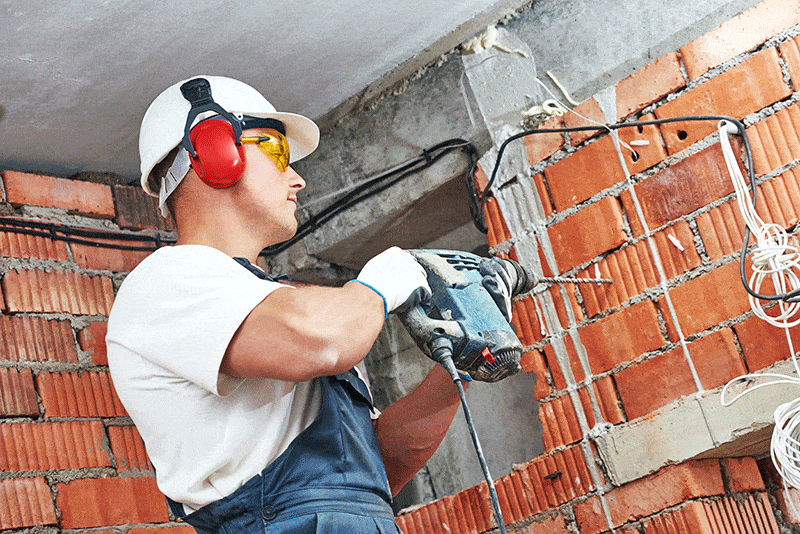
| Corded Drills | Cordless Drills |
| They are better for carpenters and contractors | They are better for infrequent use or weekend DIY-ers |
| Have a longer lifespan because don’t require batteries | They may wear out faster and require battery replacements over time |
#3 Long Projects
Another factor that will help you choose the best drill is to analyze how long you will be using it. Will you be using the drill throughout long working days? Or will you only need it for a couple of minutes at a time?
If you use your drill pretty much non-stop throughout the day, you need a corded drill. Why do I say that?
- You must plug it in to use it. You do not have to charge the battery on a corded drill. You can use the drill as long as it is plugged in.
- They perform well throughout the day. The rotating force in torque is powered by the uninterrupted flow of electricity. This means that there are no limitations in voltage that could occur with a battery-charged cordless drill.
- Corded drills are lighter. Corded drills are lighter because they do not have the added weight of a battery in the drill. Since they are lighter, they are easier to use. A lightweight drill could also help to reduce the effects of wrist fatigue. That’s right, you should use a corded drill if you are looking for a way to take the load off.
| Corded Drills | Cordless Drills |
| They are better for long, all-day projects | They are ideal for short projects |
| You do not need to worry about the battery depleting | You have to charge them before use |
| They are lighter | The battery depletes quickly if the drill is in constant use |
| They are heavier |
#4 Small Working Spaces
While cordless drills may be heavier than corded drills, they’re still a great option for tight spaces where mobility is important.
Here’s why that’s true:
- You don’t have to worry about the cord getting in the way. If you have limited mobility, it can be very frustrating to have a great dangling cord in the way of your workspace. With a cordless drill, you will be able to maximize your working area.
- Cordless drills are safer. If you are working in a small space, you should clear it of all obstructions. With a cordless drill, you won’t have to worry about tripping over any cords.
| Corded Drills | Cordless Drills |
| The cord can get in the way of your workspace. This is especially the case when you are working in small spaces. | A cordless drill helps you work in tight spaces with no obstacles in your way. |
| There exists the safety hazard of tripping over the cord. | You will not have to worry about tripping over the cord. |
#5 Working Without Power Outlets
Are you working on a new house? Are you keen to get some drilling done in the backyard? Do you need the freedom to be able to take your drill with you on the go?
A cordless drill gives you unlimited range when you are working. You can take the drill with you to get jobs done anywhere you need to.
Cordless drills are great for some of the following reasons:
- They give you an unlimited range. Forget extension cables. Say goodbye to that frustrating feeling of not being able to get to that last spot that’s just out of reach. With a cordless drill, you can get the job done no matter where it is.
- You can work even where there are no power outlets. Are you working on a building site? Do you need to get some drilling done in the backyard? You can work with a cordless drill without being near an outlet.
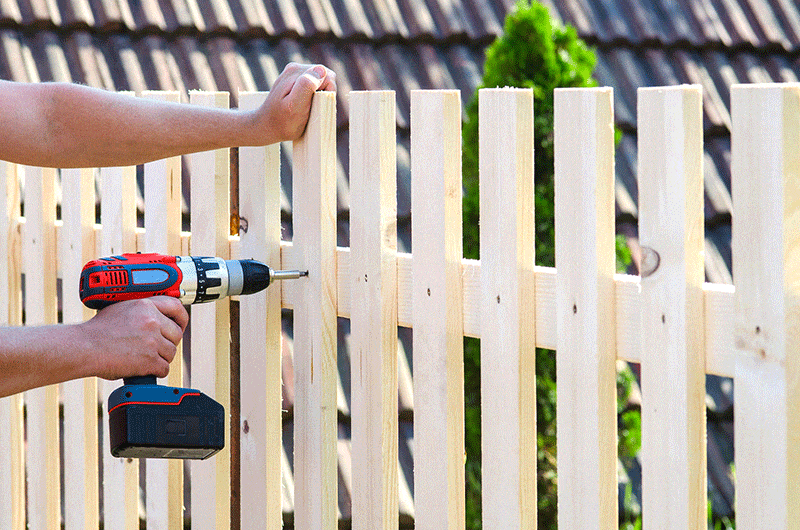
| Corded Drills | Cordless Drills |
| They have a limited working space | They have an unlimited range |
| You have to work where there is a power outlet | You can work anywhere |
#6 Weekend DIY-ers
Although we’d like to, we can’t spend all day every day rooting around and finishing off DIY projects.
Would you say you are more of a weekend DIY-er than a fully-fledged carpenter or contractor? Then which tool will be best suited to you?
Cordless drills are best for those who use a drill occasionally. Here’s why:
- Cordless drills are perfect for completing mini-jobs around the house. These drills are easy to use, and they are awesome to grab and go. Just make sure that you charge up the battery ready for next time.
- You can use cordless drills anywhere. You can use your cordless drill to finish off that last pesky job in the yard, in the attic, basement, anywhere! What’s more, you won’t need to waste time finding and unraveling that pesky extension cord. Simply get the job done, then you can get on with your weekend.
| Corded Drills | Cordless Drills |
| They are not ideal for periodic use | They are perfect for weekend DIY-ers |
| You have to work where there is a power outlet | You can work anywhere. Great to grab and begin using straight away. Complete jobs anywhere in the home, yard, or beyond. |
#7 Small Projects
Are working on a small project? Will you often use your drill to do bits and bobs around the home? Then which drill will be the best for you?
A cordless drill is the best for working on small projects. If you will be using the drill infrequently, cordless will be the ideal choice for you. Let’s see why:
- You don’t need to plug a cordless drill in. Simply pick yours up, and start using it immediately. It is quick and easy to use.
- Cordless drills are perfect for mini awkward jobs. Is it your turn to fix the hinge in the cupboard under the sink? How about the shelf in the bathroom that looks a little lopsided? With a cordless drill, you can work anywhere. You won’t need to worry about your nearest power outlet. You can also work on awkward jobs without having an annoying cord hanging in your face.
| Corded Drills | Cordless Drills |
| They are not ideal for working on small projects | They are perfect for working on small projects |
| It could be irritating to have to plug the drill in just to do quick jobs around the home. | You do not need to plug them in |
| You don’t have to worry about a cord |
Conclusion
Choosing between a corded and a cordless drill is tricky. After all, both are fantastic drills.
Even so, your decision may change depending on what you will be using your drill for. It may also change based on how often you will use the drill.
You should use a corded drill if:
- You need the drill to do high-precision, heavy-duty jobs
- You are a contractor or a carpenter
- You are working on long projects where you will be using the drill throughout the day
You should use a cordless drill if:
- You are working in a small space
- You often need to work where there aren’t any power outlets
- You are a weekend DIY-er
- You will need the drill mainly to work on small projects
If this article has helped you, then why not check out some of our other articles and free guides? You could even sign up for our email list!
Have a great day!
—Craig.
Frequently Asked Questions
How Do I Maintain a Corded Drill?
Taking care of a cordless drill is not very complex. Just make sure that the chuck is always properly lubricated and keep the power tool away from extremely high temperatures and moisture.
What Are Other Uses for Corded Drills?
Aside from their typical uses, you can also use corded drills for stirring paint, mixing mortar and concrete, and more. As long as you have the necessary attachments, the sky’s the limit.
What’s the Average Lifespan of a Cordless Drill?
If you care for the drill properly, maintain it often, and repair it as soon as you notice something’s wrong, you should expect your cordless drill to last anywhere between 5–10 years.
This, of course, assuming that your power tool is from a reputable manufacturer and made of high-quality materials.





